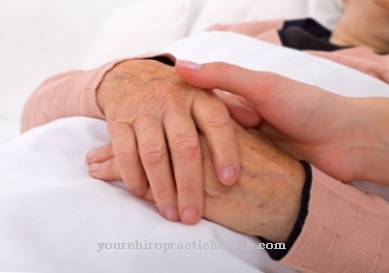A Alkalosis refers to the deviation of the pH value to values above 7.45. It can have respiratory or metabolic causes and is prevented or combated in the long term in the body by buffer systems. If the pH value stays above the healthy value for a long time or if it deviates massively for a short time, this has fatal consequences for almost all body cells.
What is alkalosis?

The topic of alkalosis takes us deep into human physiology and also a little into chemistry. Every single one of the millions of body cells needs a constant milieu with a pH value between 7.35 and 7.45.
So slightly alkaline, but not too alkaline and certainly not acidic. So that the demanding body cells are guaranteed to receive this milieu, many so-called buffer mechanisms in the blood and in the tissue regulate the pH value. If this then deviates to alkaline (i.e. upwards), one speaks of an alkalosis - the blood becomes alkaline.
Medicine distinguishes a respiratory, i.e. breath-related, from a metabolic alkalosis, the latter is metabolic-related and is the responsibility of the kidneys.
causes
The main sufferers of a deviating pH value are actually always the proteins that are present in the blood and in all body cells and are necessary for a multitude of vital functions. In a normal pH environment, these proteins are in a certain functional state, but if the surrounding cell water becomes acidic or alkaline, they "denature" and can no longer function.
To prevent this, buffer systems are constantly working to keep the pH value of the cell and blood plasma constant between 7.35 and 7.45. Especially during physical work, a lot of acid accumulates in the human body, which is initially bound in the blood via bicarbonate and transported to the lungs, where it is then exhaled in the form of carbon dioxide.
If you breathe too quickly and too much, more carbon dioxide is exhaled than necessary and the body loses more acid than originally planned - the result is alkalosis, in this case respiratory alkalosis. This happens, for example, with psychogenic hyperventilation, with a panic attack. Serious lung diseases, such as pulmonary embolism, can also lead to insufficient oxygen saturation of the blood, the affected person becomes short of breath, breathes faster and gasps for air and, paradoxically, loses too much CO2.
Furthermore, severe pain and stays at high altitudes (mountain climbing) can cause hyperventilation. On the other hand, the kidneys are constantly working to keep the body water environment constant. Bicarbonate is constantly being filtered and reabsorbed here - the physiology of the kidney is very complex and goes far beyond the scope here.
Let us leave it at the point that a disorder of kidney function can also lead to metabolic alkalosis. One example is the exaggerated therapy with diuretics, i.e. drugs that influence the excretion of water through the kidneys. A lack of potassium can lead to alkalosis.
In addition, if vomiting is severe or frequent, a lot of stomach acid can be lost, which leads to metabolic alkalosis.
The most common cause of alkalosis is by far psychogenic hyperventilation. The tricky thing is that the originally unnecessarily increased breathing rate leads to the exhalation of CO2 and thus to alkalosis, which in the affected person then increases the feeling of panic and shortness of breath and in turn causes an increased respiratory drive. A vicious circle arises.
In truth, the blood is maximally supplied with oxygen and only the acid-base balance is out of balance. Breathing back into a bag helps: carbon dioxide accumulates in the bag and is inhaled again directly in the next breath. The most important thing you can do is calm down the hyperventilator. A hospital admission is usually no longer necessary after a few minutes.
You can find your medication here
➔ Medicines for calming & relaxationSymptoms, ailments & signs
With respiratory alkalosis, muscle spasms, hyperventilation and dizziness occur, among other things. Palpitations and other cardiovascular complaints can also occur. These symptoms are often accompanied by panic attacks and anxiety attacks. Externally, there is an increase in the pH value due to the "paw position", in which the fingers and the wrist involuntarily cramp.
Other typical signs are abnormal sensations in the hands and feet, symptoms of paralysis and occasionally also slight, indefinable pain in the limbs. Metabolic alkalosis shows similar symptoms: cardiac arrhythmias, cramps and muscle weakness occur. In addition, there may be sensory disorders of the skin and signs of hypotension.
Many sufferers suffer from general weakness, confusion and difficulty concentrating as a result of a shift in pH. Severe metabolic and respiratory alkalosis can lead to unconsciousness. Both forms are often expressed by sweating, changes in skin color and fluctuations in blood pressure.
A chronic illness can manifest itself as gastrointestinal complaints and a decrease in physical and mental performance. These symptoms can usually be used to clearly diagnose alkalosis.
Diagnosis & course
Other symptoms of respiratory alkalosis are tingling and cramps in the muscles such as the typical "paw position" of the fingers. A subjective feeling of shortness of breath and chest feelings almost always occur and fatally cause the person concerned to breathe even faster.
In the case of metabolic alkalosis, on the other hand, very shallow and slow breathing often occurs to compensate for keeping as much CO2 in the body as possible. Furthermore, muscle tremors or cardiac arrhythmias can also occur here.
In the clinic, alkalosis is diagnosed using a blood gas analysis: a small drop of capillary blood from the ear or finger is sufficient.
Complications
Alkalosis is a serious symptom that must always be treated by a doctor. The change in the pH value usually causes tingling in the muscles and cramps in the muscles. Patients often complain of a tightness in the chest and therefore breathe more in and out.
It comes to disturbances of the heart rhythm and also to a tremor of the muscles. In the worst case, the alkalosis can lead to fainting and eventually death if left untreated. In most cases, surgery is necessary. If the treatment is carried out quickly enough, there will be no further complications.
However, the patient will have to go to the doctor more often in the future in order to avoid the alkalosis in the future. In acute alkalosis, potassium can also be administered, which temporarily blocks the symptom. If the alkalosis occurs after vomiting, there are usually no complications. Here the symptom will go away on its own if the vomiting also stops and does not last.
When should you go to the doctor?
In any case, alkalosis has a very negative effect on the health of the person affected and must therefore be treated in each case. If there are large long-term deviations, this can lead to death in the worst case. A doctor should be consulted if the symptoms of alkalosis occur. This includes tingling in the muscles and pain or pressure in the chest and when breathing. It is usually difficult for the patient to breathe and they experience difficulty breathing.
In acute emergencies, an ambulance should be called. A doctor should also be consulted or informed immediately in the event of muscle tremors or cardiac arrhythmias. Urgent treatment is necessary in the event of severe convulsions or epileptic fits. Furthermore, the affected person may faint from breathing difficulties. Here, outsiders must ensure that loss of consciousness does not result in injuries in the event of a fall. It is not uncommon for alkalosis to lead to sweating or panic attacks. Treatment by a psychologist can be useful here.
Doctors & therapists in your area
Treatment & Therapy
An alkalosis is always primarily treated for the underlying disease. In the case of a pulmonary embolism, this means immediate blood thinning and intensive medical monitoring, and in rare cases intervention or even surgery.
Pain should be adequately treated with pain relievers so that the person can breathe more easily. If a potassium deficiency caused the alkalosis as a side effect of diuretic therapy, the drug must be discontinued immediately and, if necessary, replaced by a potassium-sparing diuretic. In the short term, if the symptoms are severe, the pH value can possibly be corrected with infusions of table salt and potassium.
The potassium is a trick with which it is possible indirectly to move acid out of the cells into the extracellular space and there to compensate for the alkalosis. Since this does not in principle change anything in the overall "base excess" situation, treatment of the underlying disease must be followed.
Hyperventilation, the main cause of symptoms of alkalosis, can now be completely eliminated by rebreathing in the bag.
Outlook & forecast
Due to the alkalosis, there are primarily severe discomforts in the patient's breathing. Those affected suffer from acute shortness of breath, which can also lead to panic attacks or fear of death. There is also a lack of potassium, which has a negative effect on the patient's overall health.
The person concerned feels weak and tired and the patient's resilience drops drastically. Ordinary activities or sports can therefore no longer be carried out easily due to the alkalosis. Cramps can also occur in various parts of the body, which make everyday life much more difficult for the person concerned.
Often the patients suffer from difficulty concentrating. Sometimes thinking and acting are no longer possible for the patient. Heart problems can also occur, so that in the worst case the patient dies of cardiac death.
Treatment of alkalosis can be carried out with the help of drugs and infusions. There are no further complications. The symptoms usually disappear again relatively quickly and the general condition of the patient improves.
You can find your medication here
➔ Medicines for calming & relaxationprevention
There is actually no specific prophylaxis of alkalosis due to the very wide variety of underlying diseases. In general, of course, every time you take medication, you should constantly weigh the sense and purpose against the risk of side effects.
If diuretic therapy is nevertheless necessary from this point of view, a blood gas analysis should be carried out regularly by the doctor so that an alkalosis is noticed in good time. The same applies to all diseases that are associated with a tendency to alkalosis.
Aftercare
In most cases, direct follow-up care is not possible or necessary for alkalosis. With this disease, the affected person is dependent on treatment in order to avoid further complaints and compilations. If the alkalosis is not treated, the patient will die in most cases. For this reason, early diagnosis and treatment of alkalosis have a very positive effect on the further course of the disease.
If the alkalosis is treated with an operation, the patient must rest after such an operation and take care of his body. You should therefore refrain from strenuous activities or sporting activities. Potassium can also be taken to relieve the symptoms of alkalosis. The patient should ensure that they are taken regularly.
If the alkalosis is triggered by a drug, it is recommended that this drug be discontinued. Only then can the disease be fully treated. However, stopping medication should only be done after consulting a doctor. In some cases, the alkalosis also reduces the patient's life expectancy. However, this depends heavily on the underlying disease that is responsible for the alkalosis.
You can do that yourself
What patients can do themselves depends on the causes of the alkalosis. If this is due to the excessive use of diuretics, such preparations should only be taken after consulting a doctor. Any abuse in the context of a reduction diet must be stopped immediately.
If the alkalosis is due to a potassium deficiency, a balanced diet and the consumption of mineral water containing potassium will help. Avocados, bananas, kiwis, grapes, and strawberries are also good sources of the mineral. Since heavy sweating is associated with an increased loss of potassium, it can be useful for athletes to take dietary supplements. However, this should not be done without consulting a doctor.
If the pH value is too high because too much CO2 is exhaled, as is often the case, for example, with psychogenic hyperventilation, the patient can first take preventive measures. Situations that trigger a panic attack must be avoided as much as possible. With the help of relaxation techniques such as yoga or autogenic training, those affected can learn to better control themselves in stressful situations. In the event of an acute attack, it helps to breathe in a paper bag, as the excreted CO2 is immediately returned to the body and a further increase in the pH value is avoided.

.jpg)

.jpg)

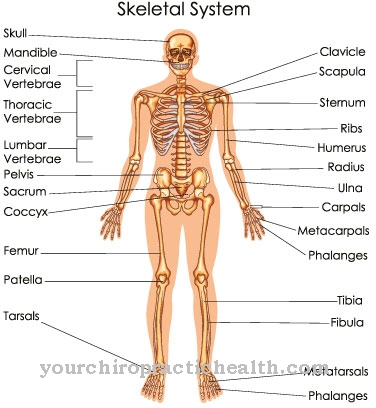




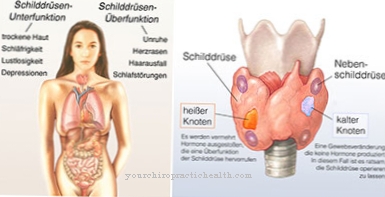






.jpg)




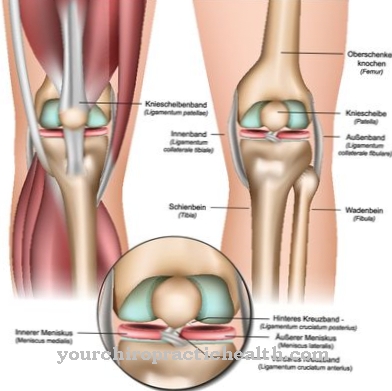

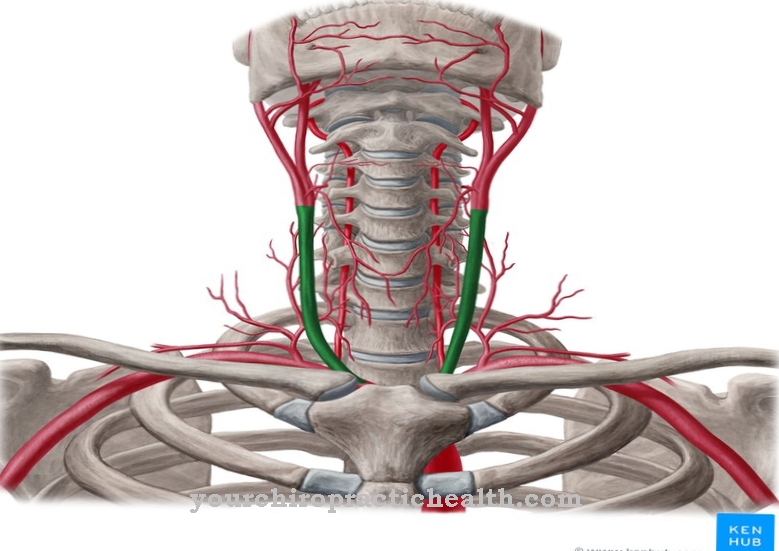
.jpg)

